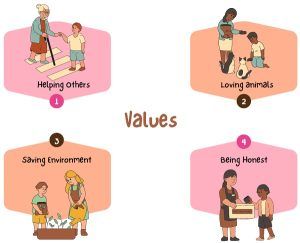Have you ever stopped to think about why people behave the way they do? Why do some cultures prioritize individual freedom while others emphasize collective responsibility? The answers lie in deeply ingrained values, the guiding principles that shape our beliefs, actions, and interactions. Sociology, the study of human societies, sheds light on these values and their impact on our lives. In this article, we’ll delve into the world of values in sociology, exploring their definition, types, and real-world examples.

Image: www.achieveriasclasses.com
Exploring the Landscape of Values in Sociology
Values are fundamental beliefs that define what is good, right, desirable, or important in a society. They represent shared ideals and guide individual and collective behaviors. Sociologists understand that values are not static; they evolve over time, influenced by cultural shifts, historical events, and technological advancements.
Think of values as a compass guiding societal navigation. They provide a framework for understanding how individuals and groups interact, make decisions, and shape social structures. From the way we raise our children to the laws we create, values shape the very fabric of our world.
Understanding the Nature of Values in Sociology
In sociology, values are often categorized into two broad types: material values and non-material values.
Material Values
Material values emphasize the importance of tangible possessions and financial success. Societies valuing material wealth might prioritize economic growth, consumerism, and accumulation of assets. This focus on material well-being can shape economic policies, social status, and individuals’ aspirations.

Image: keydifferences.com
Non-Material Values
Non-material values, on the other hand, prioritize intangible qualities such as spiritual beliefs, personal growth, family relationships, and the pursuit of knowledge. Societies with strong non-material values might place greater emphasis on education, environmental sustainability, social justice, or religious practices.
Illustrative Examples of Values in Action
To grasp the real-world impact of values, let’s examine some compelling examples:
- Individualism vs. Collectivism: The US, with its emphasis on individual freedom and self-reliance, reflects strong individualistic values. In contrast, cultures like Japan, with a focus on group harmony and social responsibility, embody collectivist values. These contrasting values influence everything from parenting styles to political systems.
- Environmental Sustainability: The growing global concern for climate change and environmental protection stems from an evolving value system. Societies prioritizing environmental sustainability are implementing policies to reduce carbon emissions, conserve natural resources, and promote sustainable practices.
- Gender Equality: The fight for gender equality is fueled by values of fairness, justice, and equal opportunity. Societies actively promoting gender equality are striving to eliminate discrimination based on gender and create a more equitable world.
- Social Justice: Movements advocating for social justice often arise from values of compassion, empathy, and a belief in the inherent worth of all human beings. These values drive efforts to address issues like poverty, racial inequality, and discrimination.
These are just a few examples of how values shape social interactions and influence the direction of societies.
The Dynamic Nature of Values
Values are not static; they evolve. What was once considered acceptable behavior might become unacceptable as societal norms change. For instance, attitudes towards same-sex relationships have shifted drastically in recent decades, fueled by growing acceptance of LGBTQ+ rights and the evolution of cultural values.
Technological advancements also play a significant role in shaping values. The rise of social media, for instance, has impacted our values surrounding privacy, online behavior, and the pursuit of social validation. As technology continues to evolve, it will likely continue to influence the values we hold dear.
Tips for Navigating a World Shaped by Values
We can all effectively navigate a world shaped by a complex tapestry of values by embracing the following tips:
- Cultivate Empathy: Make an effort to understand and appreciate different perspectives and values. This helps bridge cultural divides and fosters constructive dialogue.
- Engage in Critical Thinking: Question your own assumptions and biases. Evaluate information from multiple sources and be open to new ideas.
- Embrace Diversity: Celebrate the richness and diversity of human experience. Respect and learn from different cultures, beliefs, and values.
- Practice Tolerance: Accept that others may hold values different from your own. Encourage peaceful coexistence and understanding.
Q&A: Common Questions about Values in Sociology
Q: How do values impact social change?
A: Values act as catalysts for social change. When values shift, it can lead to widespread cultural and societal transformation. For example, the changing values surrounding gender roles and equality have led to significant advancements in women’s rights and opportunities.
Q: Can values be influenced by individual experiences?
A: Yes, individual experiences can shape personal values. Life events, education, and personal relationships can influence our beliefs and priorities.
Q: Are there universal values that apply to all societies?
A: While there are certain values that seem to be prevalent across cultures, such as the value of life, universal values are often debated. Cultural differences and historical contexts play a significant role in shaping individual and collective values.
Examples Of Values Sociology
Conclusion
Understanding the role of values in sociology is crucial to deciphering the complex dynamics of societies. From personal interactions to global movements, values serve as the foundational building blocks of our world. By exploring different value systems, fostering empathy, and engaging in critical thinking, we can contribute to a more harmonious and inclusive society.
Are you interested in learning more about the impact of values on your own life and community? Share your thoughts in the comments below!



/GettyImages-173599369-58ad68f83df78c345b829dfc.jpg?w=740&resize=740,414&ssl=1)


